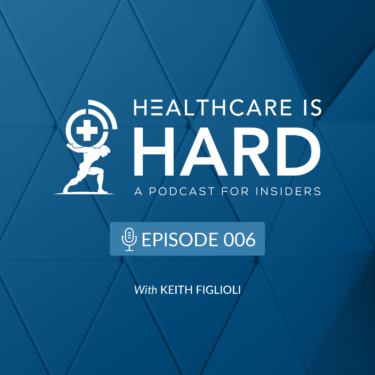Penny Wheeler, MD, and Ric Magnuson lived and breathed different sides of the healthcare industry before joining forces at Allina Health, a not-for-profit healthcare system with 12 hospitals, 90+ clinics and 52 rehabilitation locations throughout Minnesota and western Wisconsin.
Penny and Ric come from very different backgrounds. Penny is an OB/GYN by practice who later became obsessed with quality improvement – in large part due to Don Berwick and Maureen Bisognango from the Institute for Healthcare Improvement, two previous guests of the Healthcare Is Hard podcast. Ric has been in healthcare for about forty years in a variety of finance, operational, payer, teaching, and research roles across the country.
Both Penny and Ric were born and raised in Minneapolis, so to now be running one of the biggest institutions in their home city is a very unique situation for health system administrators. The two worked side-by-side briefly when Penny was a practicing physician, but it wasn’t until later on in their careers that they were really able to make an impact together.
Under Penny and Ric’s leadership, Allina thinks about healthcare holistically and is driven by practicing “Whole Person Care.” Rather than thinking of each patient as a disease or broken body part, they go much further, asking questions like: How are you feeling emotionally? How are your passions or lifestyle choices impacting your wellbeing? Do you have the right connections to the community to get the resources and care you need? Fueled by this idea of lifestyle medicine, Allina also operates The Penny George Institute for Health and Healing, an organization focused on stress management, dietary needs, and lifestyle choices to help people live their best lives.
In this episode of Healthcare is Hard: A Podcast for Insiders, Penny and Ric draw upon their years working within the health system and leading one of the nation’s most innovative health care providers to cover a number of topics with Keith Figlioli, including:
- Integrating Social Determinants of Health – Allina has started screening people for Social Determinants of Health (SDOH) at clinics and emergency rooms. These screenings look to gauge factors such as transportation needs, violence in the home, food insecurity, and utilities and housing. About one third of the people they’re seeing have an identified need and about half of the time the need they’re struggling with is food insecurity. Allina helps connect these people to viable community resources which not only improves outcomes, but lifts patients up by helping them understand that the people at Allina are truly there to care for their wholistic needs. Screening for SDOH has been a revealing experience that gives Allina real insight into the limited income people are sometimes living on and the challenges they face. Simple screenings – and being able to realistically bring connections to community resources into treatment workflows – can make all the difference.
- The Push for Value-Based Care – Penny and Ric know that the move towards value-based care (VBC) is inevitable and understand that it’s their obligation to push it forward as an organization. They talk about how Allina has moved on to VBC 2.0 and how the health system has begun experimenting and piloting ways to take risk, learn quickly, and fail fast. Many of these programs are new this year, and their plan is to learn quickly so they can expand even further in 2020 and 2021. Both Penny and Ric strongly believe this is the right method long-term and that VBC will help them design a better future for the community they serve.
- Health Systems are Becoming Platforms – While many providers are worrying about disruptors entering healthcare from the outside, Penny, Ric and Allina are focused on figuring out how to become part of the disruption by extending the platform they already have. To them, this means building around the hospitals and clinics at the core of their system and working with partners to stretch the continuum, so everyone feels constant care and support. As Ric says, it’s not just about wellness, which Allina already does well – it’s also about creating an attachment to the community. It’s about moving beyond your “four walls” and into communities and neighborhoods to deliver care in new ways. This will become increasingly more important as Millennials mature.
To hear Penny Wheeler and Ric Magnuson talk about these topics and more, listen to this episode of Healthcare is Hard: A Podcast for Insiders.
